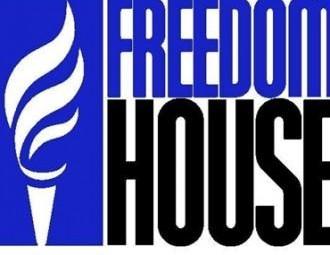In 2012 authoritarianism was aggressively supressing civil society, Freedom House says

According to 2013 "Nations In Transit" report by democracy watchdog Freedom House, countries in Central Europe are increasingly being ruled by autocratic regimes with little regard for democracy.
The result has been a worsening of existing corruption, media censorship, and violence against political opposition, the group concludes.
The annual analysis of democratic development from Central Europe to Central Asia says there has been a "troubling deterioration" in conditions for civil society across Eurasia, reports RFE/RL.
"In Eurasia, the story we saw in 2012 was one of authoritarian leadership aggressively cracking down on civil society activity," project director Sylvana Habdank-Kołaczkowska told RFE/RL in connection with the new report. "The biggest ratings change we saw on any of our indicators was related to civil society crackdowns. In some cases, this was a matter of deeply entrenched authoritarian regimes just sort of digging their heels in further, passing new legislation that further restricted civil society activities -- usually targeting freedom of assembly but on a number of issues. Sometimes it was real violence against protesters."
Knock-on repression
Uzbekistan and Turkmenistan have again been rated the worst in the region for civil society. Azerbaijan, Tajikistan, and Belarus were cited for increased persecution of perceived enemies, and Kazakhstan's government is faulted for cracking down on labor organizers.
Freedom House President David Kramer said Russian President Vladimir Putin’s return to office last year brought a return of "the worst repression Russians have suffered since the fall of the Soviet Union."
He said Putin has used his authority over the legislature, media, and the judiciary to impose new policies "designed to muzzle political opposition and civil society activism."
That has emboldened other autocrats in the region to follow suit, he said.
Legislation restricting public assembly, religious activity, and nongovernmental organizations (NGOs) was adopted not only by Russia but also Kazakhstan, Belarus, Azerbaijan, and Tajikistan. All five countries were downgraded on the group’s Nations In Transit civil-society indicator.
Nearly all bad news
Not all the news was bad. Freedom House found that Georgia and Armenia "made strides toward more competitive and fair elections as a result of new electoral laws that emphasized equal access to campaign resources and media coverage."
In Ukraine, however, the group found that parliamentary elections were marked by political prosecutions, legal manipulations, bribery, and other official abuses.
Central European states, especially new EU members, experienced political instability in part due to pressure to implement harsh austerity measures. A new government in Romania triggered a crisis when it tried to consolidate its power over state institutions.
The group says Hungary, which last year had already showed dramatic decline, slipped further away from democracy under Prime Minister Viktor Orban.
In the Balkans, Albania, Bosnia-Herzegovina, and Kosovo all received downgrades on the corruption indicator because their judiciaries were vulnerable to political interference and journalists faced intimidation and attacks.
Habdank-Kołaczkowska said in all three countries, "the implementation of reforms essential to the rule of law -- particularly those underpinning the independence of the judiciary -- has been incomplete, perfunctory, and undermined by a lack of political will."
Nations in Transit is Freedom House’s annual assessment of democratization from Central Europe to Eurasia, using the reform records of 29 countries.
-
03.01
-
07.10
-
22.09
-
17.08
-
12.08
-
30.09








































